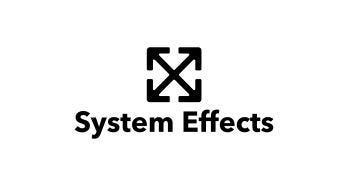I’m Luke Craven; this is another of my weekly explorations of how systems thinking and complexity can be used to drive real, transformative change in the public sector and beyond. The first issue explains what the newsletter is about; you can see all the issues here.
Hello, dear reader,
When trying to change the world around us, we tend to assume everyone experiences the world in the same way. That assumption is spectacularly—and scientifically—wrong. Individuals' lives are complex, unique and varied. The tools and methodologies we use to understand and address the issues impacting individuals must recognise that complexity. System Effects is a methodology that I developed to help us reach toward that goal. It enables decision makers respond to complex problems while at the same time embracing the uniqueness of individual experience. It has been used by policymakers in in places as varied as Norway, Vietnam and Australia to understand issues as diverse as unemployment, mosquito-borne disease, and resilience to climate change. You can learn more about the methodology and software platform in the video below and see more on the System Effects website.
I have been thinking a lot about the System Effects journey recently, particularly the contributions of my collaborator and friend, Ryan Mohr. We lost Ryan earlier this year after a difficult battle with mental illness. Ryan made System Effects possible. He took my conceptual mish-mash and turned it into something elegant. He was a talented developer, unapologetically passionate about designing simple tools to make sense of complexity. His work—Kumu, Weavr, and System Effects—brought the systems practice community together, it made rhetoric real, and it continues to have a transformative impact on the world. In recent times, Ryan and I had taken to sending each other quotes about systems and complexity that captured our imaginations. As we spoke about my idea for this newsletter, Ryan had shared a quote by Robert Musil, from his masterful epic The Man Without Qualities:
A man who is after the truth sets out to be a man of learning; a man who wants to give free play to his subjectivity sets out, perhaps, to be a writer. But what is the man to do who is after something that lies between?
So much of this series is a response to that singular provocation from Ryan. He, like Musil, was a master of ‘the hovering life’ navigating freely between truth and subjectivity, embracing both. How much work it is to stay afloat.
By the way: This newsletter is hard to categorise and probably not for everyone—but if you know unconventional thinkers who might enjoy it, please share it with them.
Find me elsewhere on the web at www.lukecraven.com, on Twitter @LukeCraven, on LinkedIn here, or by email at <luke.k.craven@gmail.com>.




I like that quote. I’m reading E.O. Wilson’s Consilience right now and am also intrigued by the things that fall in between. My newsletter, Interplace, is looking at the interface between people and place.